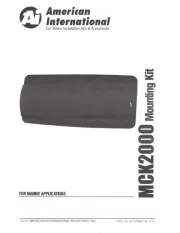Oricom MX1000 Manual
Læs gratis den danske manual til Oricom MX1000 (33 sider) i kategorien VHF. Denne vejledning er vurderet som hjælpsom af 10 personer og har en gennemsnitlig bedømmelse på 4.8 stjerner ud af 5.5 anmeldelser.
Har du et spørgsmål om Oricom MX1000, eller vil du spørge andre brugere om produktet?

Produkt Specifikationer
| Mærke: | Oricom |
| Kategori: | VHF |
| Model: | MX1000 |
Har du brug for hjælp?
Hvis du har brug for hjælp til Oricom MX1000 stil et spørgsmål nedenfor, og andre brugere vil svare dig
VHF Oricom Manualer










VHF Manualer
Nyeste VHF Manualer









